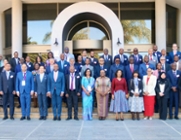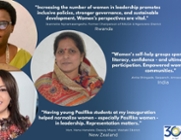An Inclusive Commonwealth
CLGF Secretary-General Dr Carl Wright
March 2016
The theme of the 2016 Commonwealth Day, 14 March is ‘an inclusive Commonwealth’. The Commonwealth, composed of 53 highly diverse countries, both large and small, highly developed and least developed, island states and landlocked states, is by its very nature inclusive. Similar considerations apply to the people of the Commonwealth, which represent so many different cultures, faiths and political affiliations. What does unite all of them, are the core values and common traditions set out in the Commonwealth Charter, above all the belief in democratic governance and fundamental political freedoms.
The Commonwealth Charter notably includes the Aberdeen Principles on Local Democracy and Good Governance, originally agreed by CLGF members in 2005 and formally endorsed by Commonwealth Heads of Governments on no less than three occasions - in 2005, 2007 and 2013 when adopting the Charter. These have inclusiveness as a core principle, stating ‘the process of local decision-making must reflect the social, economic, environmental and cultural need as of the entire community’. What this means is reaching out to women, youth, minority groups and people with disabilities, as well as to refugees and migrants. Infact, inclusiveness is in direct contrast to the often xenophobic and narrow-minded political debate which has recently arisen in many countries, including on both sides of the Atlantic.
At last year’s Commonwealth Heads of Government meeting in Malta, leaders stressed that national prosperity cannot be achieved unless women and girls are able to participate effectively in all levels of society and this is also a key aim of the new 2030 Agenda for Sustainable Development. The Commonwealth and the CLGF are committed to a target of no less than 30 per cent of women in decision-making in the political, public and private sectors, and to developing strategies for increasing their active participation.
The goal of an inclusive Commonwealth and our programmes on the ground are geared to supporting our local and central government members implement practical policies to promote inclusiveness. This entails encouraging national and local policies and practices, which support equality and integration, for example the allocation of national quota systems to encourage more women and youth to be elected as local councillors. Here there are still many differences as seen by the fact that India, with a quota system, has many women councillors, whereas in neighbouring Sri Lanka, which does not have such a system, there are very few; it is therefore to be warmly welcomed that the Sri Lanka Government has now agreed to go for a quota system in the local elections due later this year, to seek to correct this imbalance. Likewise, local governments have to be pro-active in their own communities in encouraging greater quality and inclusiveness within their communities, notably through programmes of job creation and social cohesion. This is especially critical for young people, who may otherwise feel alienated from society.
Commonwealth Day and the principles of inclusiveness will be celebrated all over the world on 14 March. This will include the traditional Westminster Abbey multi-faith service in London in the presence of HM Queen Elizabeth, Head of the Commonwealth, and its resounding affirmation in international understanding and global cooperation. Having been privileged to participate in this service, I am delighted that on this occasion I will be joined by our Chairman Mayor Lawrence Yule and our incoming Chairperson Rev Mpho Moruakgomo at what will be a most inspiring occasion.





